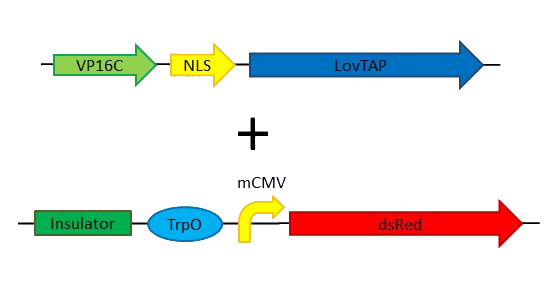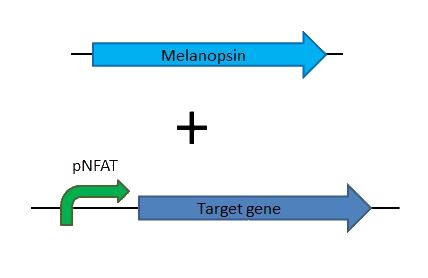Our parts
We managed to submit 3 new and characterised parts that will give other teams the possibility to reproduce our experiments with both the switches we tested.
The [http://partsregistry.org/Part:BBa_K838002 melanopsin coding gene] will allow to use the more complex switch, by just cloning melanopsin into a mammalian vector and cloning a readout gene (fluorescent protein, quantitatively measurable protein) downstream the commercially available mammalian vector [http://www.promega.com/resources/protocols/product-information-sheets/a/pgl430-vector-protocol/ pGL4.30] containing pNFAT, the promoter activated by presence of NFAT which is the outcome of the calcium channel mediated pathway.
We also submitted our favorite parts, which are a mammalian [http://partsregistry.org/Part:BBa_K838000 LovTAP-VP16] and a [http://partsregistry.org/Part:BBa_K838001 composite readout system] build to respond to LovTAP-VP16 activation. Both parts only need cloning into a mammalian vector to be ready for transfection.
<groupparts>iGEM012 EPF-Lausanne</groupparts>
How to use
1) Cloning:
First clone the part into a mammalian expression vector such as [http://products.invitrogen.com/ivgn/product/V79020?ICID=search-product pcDNA3.1(+)] or [http://products.invitrogen.com/ivgn/product/V04450 pCEP4]. These are the two main expression vectors we used. To use the melanopsin pathway, you also need to clone any gene you want to express into the mammalian vector [http://www.promega.com/resources/protocols/product-information-sheets/a/pgl430-vector-protocol/ pGL4.30].
2) Choose your switch:
- Simple switch = LovTAP-VP16 + LovTAP readout
- Complex switch = Melanopsin + pNFAT-target gene
3) Transfection Co-transfect the combination of photoreceptive protein and readout construct of your choice in mammalian cells!
 "
"


